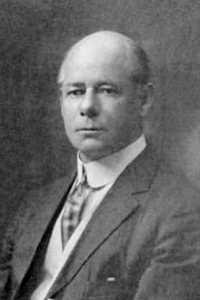“It’s a cold, moonless spring night when the keel of a large passenger ship sails across the Atlantic.
It sails so fast, in defiance of all caution, it’s about to break any crossing record.
It is technologically at the forefront, such that the builders consider it unsinkable.
Suddenly, the shape of a big iceberg appears in the darkness.
Too late to correct the course; the impact is inevitable.”
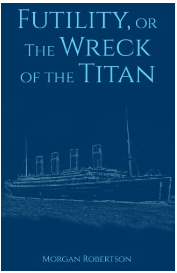
This is not a newspaper article about what happened to the famous transatlantic Titanic but some extracts from the dramatic story reported in the book “Futility or The Wreck of the Titan” (“Futility” in the first edition of 1898), written by Morgan Robertson and translated in the Italian edition with the title “Il Naufragio del Titan”. The correspondence and analogies in this novel, written 14 years before the Titanic tragedy, are numerous.
The coincidences between reality and imagination are so incredible that it is normal to wonder if this novel is really a prophecy or the accurate and meticulous analysis of an event that, given those characteristics, could have happened statistically.
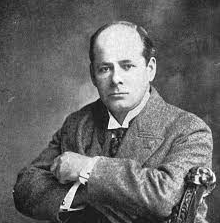
Even today this novel continues to stir curiosity and questions, fuelling an aura of mystery. Who is Morgan Robertson?
He is an american writer and “inventor”. Inventor because he claimed to have designed the prototype of the periscope used on boats, however he did not obtain the patent granted to other inventors.
He was born in 1861, son of a navy captain. He was embarked for about 10 years on merchant ships and for these reasons he knew the sea, its dangers and pitfalls…
Moreover, at that time, maritime transport was almost as important and fundamental as the air transport of our day.
As for the hypothesis that a ship could be wrecked because of the collision with ice blocks, it was not a literary fantasy but a reality and indeed the most feared event on the North Atlantic route.
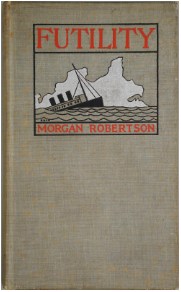
Not to mention that about 6 years prior to the publication of the book, there were rumors about the construction of a boat able to beat every record in speed and size but was, above all, defined unsinkable thanks to its hull divided into 16 watertight compartments, therefore designed to stay afloat even if some compartments were to have loaded water.
In the light of these considerations, can we still call Morgan Robertson a seer? Or was it simply his intention to warn us not to underestimate an impending danger?
Even the first title of the work seems very eloquent to me: “Futility”!
It is difficult to say and we will never know, even though he calls himself a psychic, one who drew his inspirations and ideas from “his companion in astral writing”.
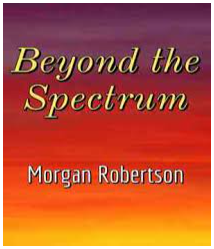
To support this peculiarity, another one of his books comes to our rescue, written in 1914, a year before his death, entitled “Beyond the Spectrum”.
In this work, the writer tells us about a war between the United States and Japan as a consequence of a surprise attack by the Japanese, with blinding weapons, on a naval expedition.
Once more, 27 years in advance, Robertson predicts what will happen in Pearl Harbor (actually a military base), and which will determine the entry of the United States of America in World War II.
